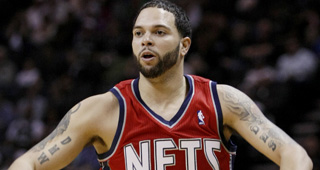With the NBA beginning their lockout, a lot of European basketball fans begain to believe that the time when the biggest NBA stars would move to Europe had finally arrived. Just imagine Kobe Bryant playing for Armani Jeans Milano, Dirk Nowitzki wearing Brose Baskets Bamberg’s jersey, and Deron Williams leading CSKA Moscow back to the Euroleague Final Four. Euroleague teams full of NBA stars sounds too good to be true.
However, this situation reminds me of the 2008 offseason.
Brandon Jennings, a former U.S. high school hoops star, decided to skip college to play professionally in Europe for Lottomatica Rome, while Josh Childress left the Atlanta Hawks and to join Olympiacos Piraeus in Greece.
Everybody began to talk about an upcoming invasion of American-born NBA players to Europe. Moreover, it was believed that the most powerful and ritchest European teams would compete with NBA clubs for the best athletes in the world. After three years and no mass exodus, it is easy to say that the dream has not come true.
Of course, a lockout is a different situation with its issues and advantages for European basketball but I see one obvious similarity with the high expectations and disappointing results of 2008. Despite the fact that European NBA players like Pau Gasol, Andrei Kirilenko and a few others will likely come back to Europe to play hoops in their home countries, the majority of NBA superstars or even role players will stay at home in the U.S.
Even though few NBA stars would like to take their talent to Europe, there are a few serious reasons why Euroleague teams should not sign NBA players. Insurance and letter of clearance from FIBA are two main elements that concern Euroleague teams and which could keep them away from bringing NBA superstar to their camp. Besides, there are many more reasons:
Approach. In general, the game in Europe is different. There is more defense played, along with a pass-first attitude and more plays on offense. Would all NBA stars like to change their game, e.g. the way they played for 10 years? Furthermore, they would have to listen to coaches, who have never played in the NBA, never won an NCAA championship or coached a college team, to make their game suitable for Euroleague.
Motivation. Most of the NBA players have always dreamed about competing for an NBA title, fighting in playoffs and getting a ring on their finger. What about giving everything you can to get Euroleague trophy? Not so sure? What about risking your health to become a Polish or French league champion? I guess winning European basketball trophies would inspire few NBA stars.
Price. Those days when European teams paid crazy money for every good but not great player are over. Financial crisis and bankruptcies slowed down the market and according to few Euroleague teams, players’ salaries have significantly dropped since 2008. Moreover, with the NBA lockout and more great players on the market (bigger supply as a result), smart European teams will have a chance to sign European players for an even lower price and for longer contracts.
Conditions. As I wrote in my ‘D-League Versus Europe’ (Part I and Part II) articles, there are a lot of advantages (as well as disadvantages) of playing in Europe. Teams are paying living costs and their taxes, affording an opportunity to see new places and gaining new experiences. However, not all of the experience could be as good for every NBA player. Feeling unsafe during games, no private planes and flights with stops, and two practices per day all season long are all potential negatives. Would he get use to it? That’s a big question.
Instability. Imagine Fenerbahce Ulker Istanbul with Al Horford, Carl Landry and Brandon Jennings reaching the Euroleague Top-8 with a 10-0 result in regular season and 6-0 in the Top-16. And suddenly the NBA lockout is over; all three ‘Turkish’ stars will have to go back to the NBA. What should Fenerbahce Ulker do then? Certainly, that’s just my imagination but clubs wouldn’t be secure from this situation. Signing an NBA player, who could leave your team at any time is a risky move. Euroleague teams managers should know that with the first big NBA player signing, all upcoming finals and the end of the next season will be at stake.



